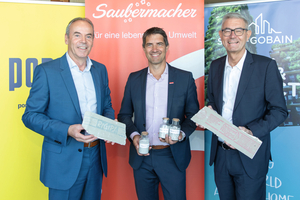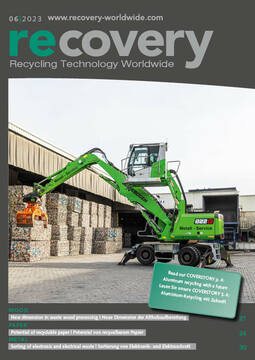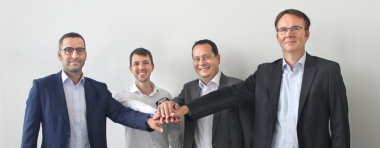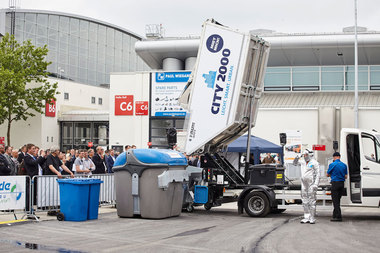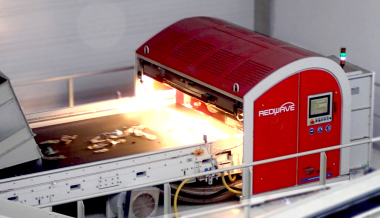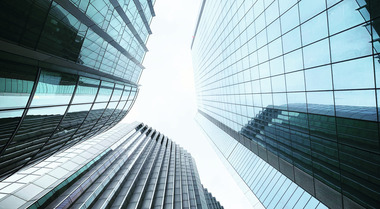Starting signal for the first
gypsum-to-plaster recycling plant in Austria
Construction company PORR, drywall specialist Saint-Gobain (known as the RIGIPS brand) and waste management company Saubermacher are launching Austria‘s first gypsum-to-gypsum recycling plant. The new plant will have an annual capacity of around 60 000 t and is thus able to cover the demand in the east of Austria. This not only conserves Austria‘s not infinitely available raw material resources, but also the limited landfill volume. This joint initiative proactively fulfils the nationwide landfill ban on gypsum plasterboard, which comes into force on 01.01.2026, and achieves a further milestone in the Austrian circular economy. Federal Minister Leonore Gewessler also welcomes the gypsum-to-gypsum project presented. The realisation requires an investment sum of € 7 million, divided between the gypsum-to-gypsum (GzG) recycling plant and the logistics solution. Commissioning at the Saint-Gobain site in Stockerau is planned for mid-2025.
Gypsum-to-gypsum recycling –
circular economy is teamwork
PORR and Saubermacher are active as strong players in the demolition and disposal market, which ensures the delivery of the gypsum waste. The recycling specialist Saubermacher offers, among other things, new digital logistics solutions to bring the construction sites‘ gypsum waste to the processing plant in a transparent and traceable manner. PORR recycles around 2 million t of construction waste per year, making it the largest recycler in the Austrian construction industry. The majority of this replaces primary raw materials on the company‘s own construction sites and plants.
After processing, the recycled gypsum (RC gypsum) is transported in a CO2-friendly way by rail to Bad Aussee, where the dry construction specialist Saint-Gobain produces new plasterboard (RIGIPS boards) again from the recycled material. Up to 40 % recycled gypsum can be used in a new plasterboard. This conserves the raw material natural gypsum in equal measure. “Only a cross-sector partnership like this makes sustainable and economical recycling possible,“ PORR, Saint-Gobain and Saubermacher emphasised in unison at a press conference. The economic viability of the project is the key to its success, as it is currently still possible to landfill cuttings and deconstruction material from plasterboard at extremely low cost. This has led to almost 100 % of the demolition material ending up in landfills so far.
No recycling without unmixed collection
“Gypsum is endlessly recyclable, but in order for recycled gypsum to be used again in the production of new panels, special quality criteria must be met,“ explains Peter Giffinger, CEO Austria at Saint-Gobain. Professional pre-sorting on the construction sites is therefore essential. “We are breaking new ground in Austria with the separation by type on the construction sites. Among other things, we are currently surveying at PORR what degree of comminution is optimal to enable good processing of the demolition material in the new plant,“ says PORR COO Josef Pein. „Successful recycling is not only dependent on the quality of the material, but also strongly on the quantity,“ clarifies Ralf Mittermayr, CEO at Saubermacher. Only if enough material is delivered does the effort pay off. Along with PORR, Saubermacher is one of the largest construction site waste disposal companies in Austria. The company has direct access to waste producers via its own waste disposal centres and, for example, the digital collection platform wastebox, which means that separate collection of gypsum waste can be trained and thus better implemented.
Legal framework essential
The legal framework plays a crucial role for a “real circular economy“. This is because the three project partners have set themselves the clear goal of meeting the targets set by EU law with regard to high-quality recycling. Thus, the present legislative text is not only about preventing the path to landfill from 1 January 2026, but also about promoting the circular economy recycling of plasterboard. For this reason, PORR, Saint-Gobain and Saubermacher support the draft of a Recycling Gypsum Ordinance, which promotes the recycling of gypsum and at the same time guarantees a high quality of recycled gypsum.
Securing the supply of raw materials
Gypsum is a natural raw material that is not endlessly available. The popular building material is extracted in mines or is produced as a by-product in chemical processes and in the flue gas desulphurisation of coal-fired power plants (FGD gypsum). Due to the European Commission‘s Green Deal, all coal-fired power plants are to be shut down by 2035, making the regional supply of raw materials even more important.
The master plan “Raw Materials 2030“ of the Austrian federal government is dedicated to secure supply. The European raw materials strategy also promotes domestic sources and recycling. In order to prevent a shortage of gypsum as a raw material, recycling is therefore to be increasingly relied on as a supplementary source. Gips-zu-Gips Recycling GmbH is taking on a pioneering role in Austria.

